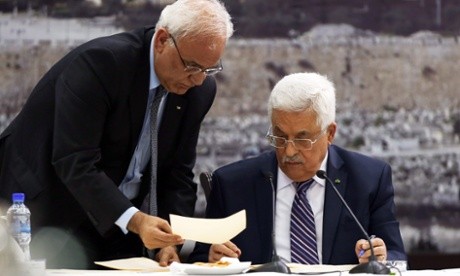(VOVworld) – The latest negotiation between Palestine and Israel on April 6 aimed at saving the Middle East peace process concluded without any breakthrough. The failure of the second US-mediated negotiation in a week and increasing tensions between Palestine and Israel have made it unlikely they with achieve a framework agreement by April 29.

Mahmoud Abbas and Saeb Erekat during meeting of the Palestinian leadership to discuss Israeli-Palestinian peace talks this week. (Photo: EPA) |
The peace talks, brokered by US special envoy Martin Indyk, has the participation of Israeli Justice Minister Tzipi Livni, Prime Minister Benjamin Netanyahu’s special envoy Isaac Molcho, Palestine’s chief negotiator Saeb Erakat, and Intelligence Head Majd Freij.
The process, began last July targeting a final framework agreement by April 29, 2014, has been pushed to the edge of collapse.
Deep disagreements
Despite some positive results from the negotiations, there has been loud criticism from both sides and negative predictions. A Palestinian official said on condition of anonymity that the crisis will continue. During the talks, Israel has continually threatened to return to the relationship it had with Palestine before the negotiations began 9 months ago.
Israel says it will condition to release the last 26 Palestinian prisoners it holds only if Palestine agrees to extend the negotiations beyond April 29. Israel knows that this condition is unacceptable because it agreed on the April 29 deadline with Palestine and the US last July. Israel’s agreement to release all prisoners was the reason Palestine agreed to suspend its accession to a number of international organizations and conferences. Israel now says it will build 700 new houses in Gilo, Jerusalem.
Israel’s actions have pushed Palestine to a decision to submit applications for membership in 15 international conventions and agreements as an independent Palestinian state.
Israel now has accused Palestine of unilaterally violating their agreement. Prime Minister Benjamin Netanyahu warned that Israel will take unilateral action against Palestine. The Jerusalem Regional Planning and Building Committee approved the construction of a museum and visitors' center in Palestine’s Silwan district, east of Jerusalem. Israel has canceled high-level meetings with Palestine and halted the transfer of communication devices to Gaza.
Palestine has announced a long list of pre-conditions for resuming talks, including Israel’s recognition of a Palestinian state along the 1967 border with east Jerusalem as its capital, the release of 1,200 Palestinian prisoners, cancellation of the construction of settlements in East Jerusalem and the west Bank, and removal of the Gaza blockade. Palestinian chief negotiator Saeb Erakat said Palestine will prosecute Israel in the international court for war crimes if tensions continue.
Pessimism about peace
In this gloomy situation, US Secretary of State John Kerry says American efforts are limited and the two parties themselves need to take constructive steps before it is too late. Kerry expressed his discouragement by canceling his planned visits to Jerusalem and Ramallah. The US has found no way to salvage the Middle East peace process.
On April 7, Palestinian Prime Minister Mahmoud Abbas called an emergency meeting with the foreign ministers of the Arab League to discuss the crisis and solicit additional political and financial support for Palestine.